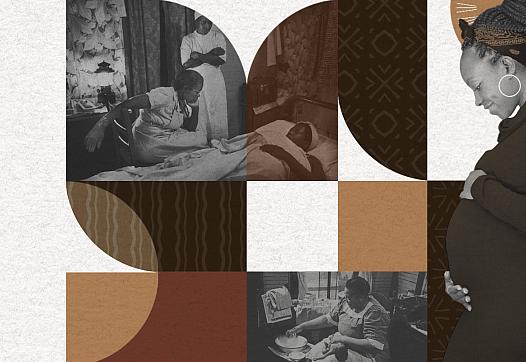Breaking the Cycle of Harm
This story was originally published in Black Voice News with support from the 2022 California Fellowship.
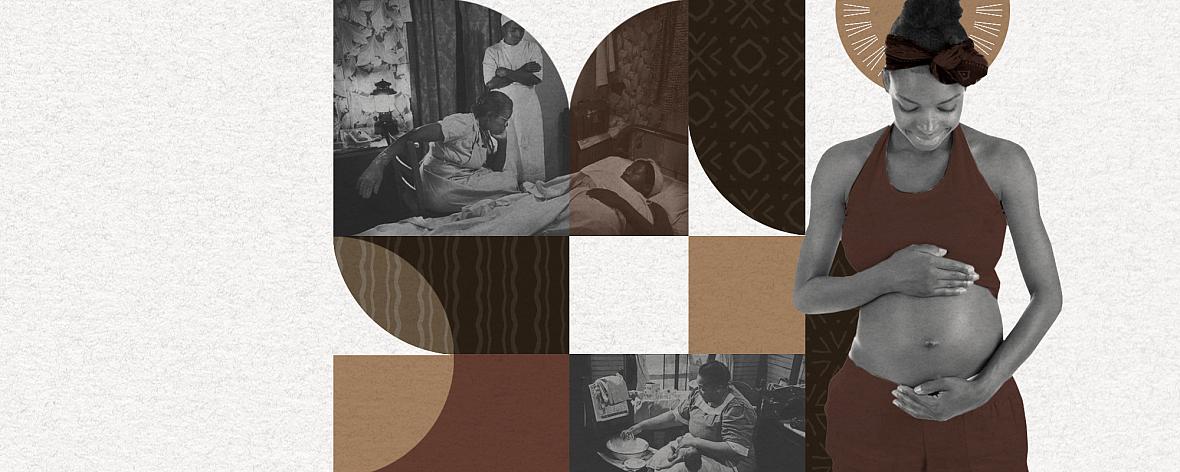
Black Voice News
“I don’t want any more of our women dying unnecessarily,” Karen Sykes stated bluntly. She has “officially” been a doula for about three years, but has been providing support to birthing people for 12 years, which began with her assisting with the birth of her first grandson.
Now, Sykes is working to expand her organization, CaliSis Doulas, to bring on more doulas and meet the needs of families across Riverside and San Bernardino Counties. Sykes has a diverse clientele of educated and young professional birthing people in the region, some who are first-time parents and others who are expecting their second or third child.
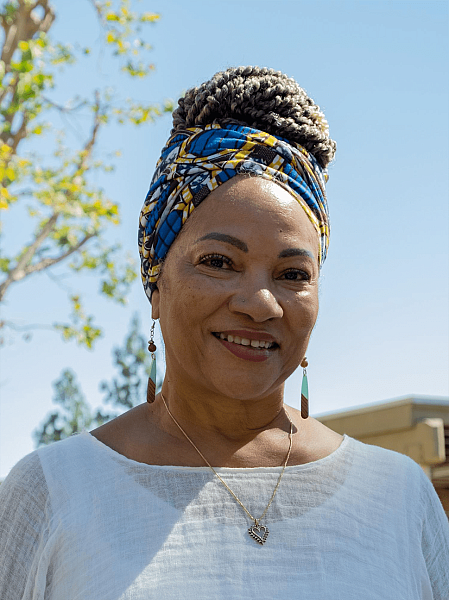
Karen Sykes smiles for a portrait during a visit with her client in Chino, CA.(Aryana Noroozi for Black Voice News/CatchLight Local). June 26, 2022.
Over the last three years, Sykes has worked alongside seven families, one of whom is due to give birth in October and another family who will be delivering via surrogate. While some doulas take on multiple families a month, Sykes takes on a few clients a year. Like many doulas, Sykes has another occupation and other duties. She also works as an Associate Pastor at the Crossword Church in Riverside, alongside her husband.
“I have determined that I don’t want to serve more than three families at a time,” Sykes stated. Sykes explained that three is her limit due to her capacity and how much she pours into each family.
On her website, Sykes describes her approach as focusing on “holistic wellness with a Christian perspective.” Part of Sykes’ approach is assessing her clients’ mental and emotional health, as well as their physical health.
“My job is not to judge them. I tell them, whatever it is that you need I’m going to support you in that,” she explained.
In June, Sykes visited with one of her current clients, Nalah Morrow, 26, for the second time. Sykes began the check up by asking Morrow to give an update about how she’s feeling, if she’s taking her prenatal vitamins and what kind of support she needs.
“How have you been doing since our last get together?” Sykes asked. Morrow explained that she recently returned home from Minnesota where she is enrolled in a long-distance educational program to become a nurse midwife.
At 24 weeks pregnant, Morrow spent time in June and July traveling back and forth between Minnesota and Chino, CA, where she lives with her husband, David and their two-year-old daughter, to complete her clinical rotations.
“This is our first time having a doula. We did not have one with [my daughter]. My experience with her wasn’t horrible. I learned more about what a doula was after I had her, and so I felt that it’s more necessary to have a doula, especially giving birth in a hospital setting,” Morrow explained. “I feel like it’s invaluable, actually.”
CHJ · Karen Sykes, CaliSis Doulas2
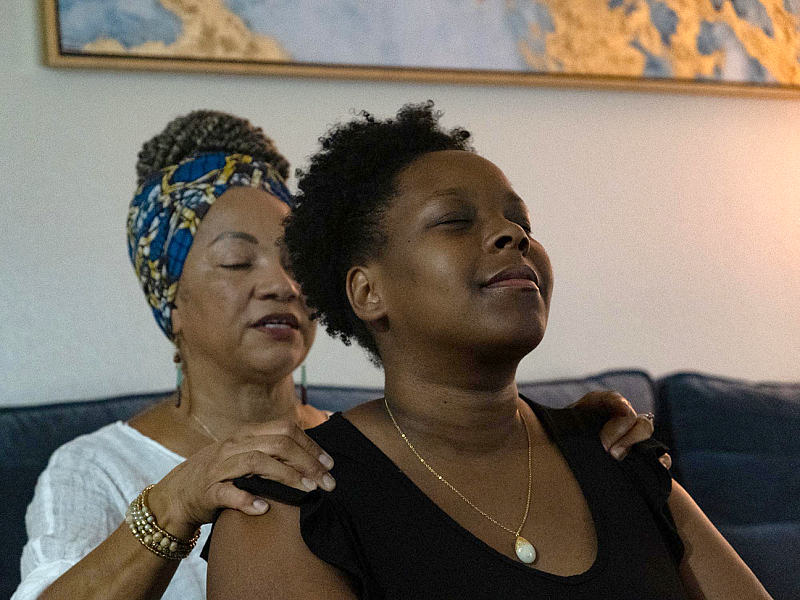
Karen Sykes guides her client, Nalah Morrow, through a breathing exercise during a home visit in Chino, CA on June 26, 2022 (Aryana Noroozi for Black Voice News/CatchLight Local).
During the visit, Sykes distracted Morrow’s daughter with jewelry while she guided Morrow and her husband through birthing exercises that will be helpful during labor.
Morrow made it clear that she doesn’t want to give birth in a hospital setting, but explained that she doesn’t have much of a choice because her husband’s health insurance is provided through Kaiser. So far, Morrow has not been pleased with her doctor who she said has been late to appointments on multiple occasions and who she doesn’t get a “good vibe” from. She explained that she thinks it’s important to like your provider.
“Every time…she’s always late, and it’s like, I get you’re busy, but there’s like no type of apology,” Morrow said to Sykes. “No, ‘I’m sorry I’m 40 minutes late to your appointment.’”
While Morrow is pleased with Kaiser’s general services, in an email she explained that when it comes to prenatal care, she feels like she is just a number on a long list because prenatal care isn’t very personalized.
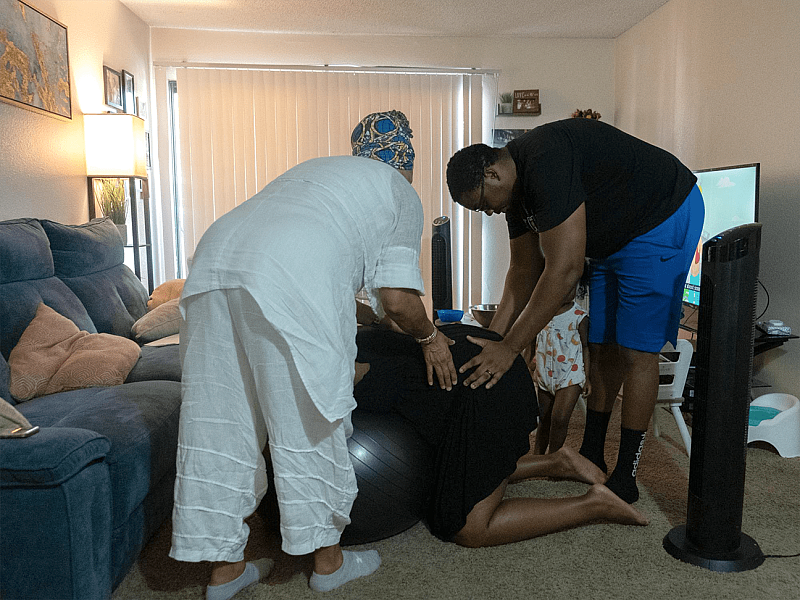
Doula, Karen Sykes guides David Morrow through an exercise that will support his wife’s labor experience and help her with pain during a home visit in Chino, CA. (Aryana Noroozi for Black Voice News/CatchLight Local). June 26, 2022.
Ideally, Morrow would like to have more personalized care with a midwife outside of the hospital setting, but because Kaiser provides midwifery care within the hospital, Morrow and her husband would be forced to pay an additional $5,000 to $8,000 out-of-pocket for the kind of care they want.
“It’s very disheartening and disappointing honestly,” Morrow wrote in an email. “I’m not able to receive the care I feel like I deserve and that I provide to others on a regular basis.”
The value of doula care
In order to make her birthing preferences known to her provider, Morrow created a birth plan. She gave Sykes a rundown of the plan which included specific instructions and directions for birth such as requesting that her husband and Sykes be in the delivery room, no intravenous therapy unless medically necessary and limited cervical examinations.
Morrow developed her birth plan based on medical knowledge, her experience as a nurse midwife in training, lived experiences and secondhand experiences of friends. Sykes commended Morrow on her birth plan: “I think it’s very comprehensive.”
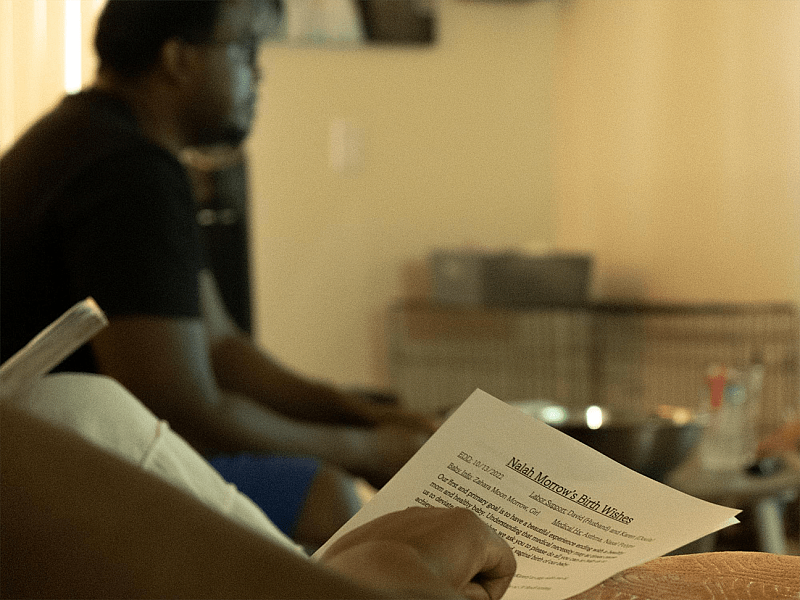
Nalah Morrow reviews her birth plan with her doula, Karen Sykes, during a home visit in Chino, CA on June 26, 2022 (Aryana Noroozi for Black Voice News/CatchLight Local).
Encouraging families to develop a birth plan is one of the ways doulas educate families on how to advocate for themselves: by establishing preferences and setting boundaries for their care before, during and after labor and delivery. Another way doulas empower their clients is by motivating them to have birthing experiences they want by practicing different methods for establishing an environment that is comforting for giving birth.
During her check in, Sykes explained the step-by-step process of what support Morrow can expect from Sykes during labor and explored the different kinds of oils she will use such as Egyptian Geranium (energizing) and Lang Lang (mixed with other oils to bring about peace). Sykes proceeded to guide Morrow through a series of stretches to “open up the pelvic wall” while she applied pressure to Morrow’s lower back.
“I feel like I have a very dominant personality, so I’m very blunt and straightforward with people,” Morrow said. “But when it comes to my own pregnancy, I feel like I’m not necessarily like that as much as I should be. So, one thing I feel like [Sykes] is doing really well for me is reminding me to keep advocating for myself.”
One of the most challenging parts of doula work can be dealing with a physician or practitioner who doesn’t embrace the family’s wishes when it comes to decisions about the birthing process, Sykes communicated.
Concerns over medical interventions
In her experience, Sykes has witnessed doctors “encouraging” women to have cesarean sections (c-sections) for non-medical reasons. Sykes recalled being present when a doctor attempted to set a date for her client to give birth and stated that if she didn’t agree to the pre-approved date, the doctor couldn’t guarantee that they would be available to deliver.
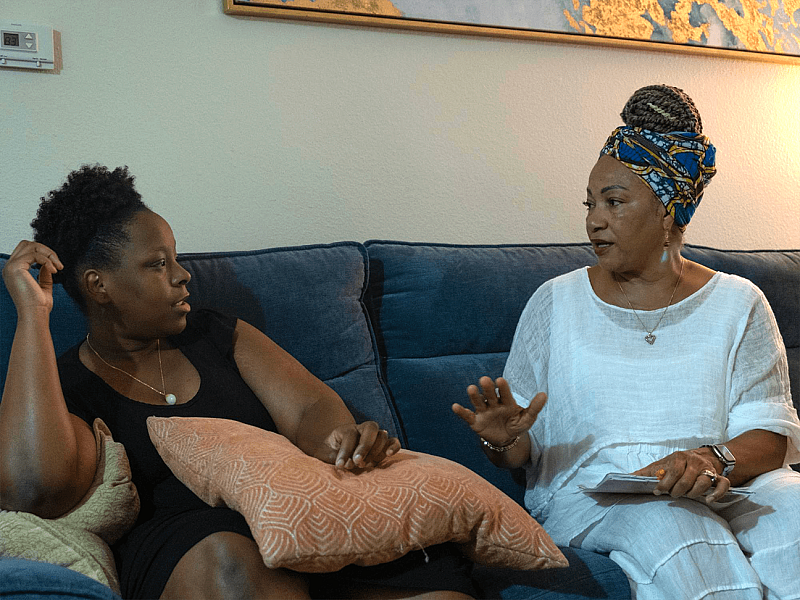
Karen Sykes and Nalah Morrow discuss Morrow’s most recent Ob/Gyn visit and how she feels about her provider during a home visit in Chino, CA on June 26, 2022 (Aryana Noroozi for Black Voice News/CatchLight Local).
A 2018 California survey of more than 2,500 Black mothers found that 80% of respondents believed that childbirth should not be interfered with unless medically necessary, and yet, Black women felt more pressured to have medical interventions during labor and delivery. The survey noted that 42% of Black women respondents gave birth by cesarean section compared to 29% of White women.
“‘How important is it really for just your OB to deliver your baby? What is the most important thing?’” Sykes had asked her client. Her client said the most important thing was to deliver a healthy baby. “I said, ‘So boom, you got your answer. And if you don’t feel like you want to do the c-section on this day, and you want to naturally go into labor and deliver your baby, that is a right that you have.’”
Sykes’ client delivered the baby — without a c-section — with no complications, and the doctor was available during the time of birth.
A study published in August 2022 examined Medicaid medical claims from three states, including California, “to compare maternal health outcomes between women who did and did not receive doula care” between January 1, 2014 and December 31, 2020.
According to the findings, “Women who received doula care had 52.9% lower odds of cesarean delivery and 57.5% lower odds of postpartum depression/postpartum anxiety (PPD/PPA)… Women who received doula care during labor and birth, but not necessarily during pregnancy, showed a 64.7% reduction in odds of PPD/PPA.”
“There tends to be a lot of recommendations or pushing families to have c-sections, to schedule the c-section on this day — we’ll schedule the c-section, you have your baby and you’ll be done,” Sykes recited. “but there’s a benefit to letting that baby be born in his or her own time.”


